“What does collaboration need to succeed? Culture and consistency!” – Corporate-Startup event recap on June 22, 2017
Interested in a candid, behind-the-scenes look that steers clear of buzzword bingo?How about a discussion with like-minded people about the questions posed by digitalization?That’s what you’ll find at CODE_n themed events!In February, experienced leaders and entrepreneurs bounced around ideas on leadership in the digital age at “The Art of Guidance”. And the conversation continued on June 22, 2017 with “Corporate-Startup-Collaboration | Fuckups, Lessons Learned, and Cultural Differences.”The evening was all about sharing experiences, straight talk how things get screwed up, and exploring the keys to fruitful collaboration between a corporation and a startup.Taking “When worlds collide” as their motto, a couple of talks and a charged panel discussion offered expert insights into this highly topical issue.We hope you enjoy reading this event recap, complete with our impressions and a roundup of the evening’s encounters between two cultures!
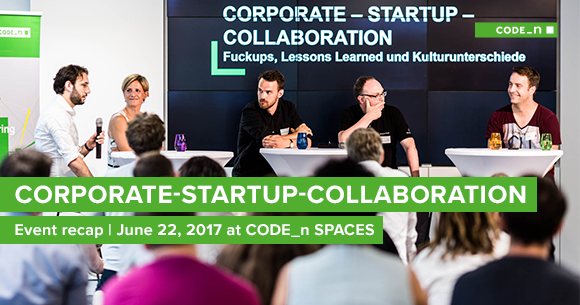
On June 22, 2017, we invited people to our Innovation Campus for an event focusing on Corporate-Startup-Collaborations. Some 60 representatives of innovation departments and startups and other interested parties braved the heatwave gripping southern Germany to listen in on some thought-provoking talks followed by a panel discussion. This was a great chance to hear startups and established companies dishing the dirt on their collaborations and sharing the lessons learned from the past months. After some brief words of welcome from CODE_n managing director Moritz Gräter, moderator Oliver Böpple kicked off the evening at 6:15 p.m. As a senior innovation manager at YOUSE and a driver of innovation methodologies such as Design Thinking, Oliver is no stranger to the issues that are currently making the rounds – the challenges of companies leaving the beaten path and exploring new directions, practicing open innovation, and sniffing out digital business models.
EnBW and Binando:A collaboration through the Activatr program focusing on smart city data
Things got started with a talk on the collaboration between energy supplier EnBW and startup Binando. Their partnership has its roots in EnBW’s efforts to identify new business models outside its existing corporate structure. In addition to in-house innovation initiatives such as the formation of an innovation campus and internal startup teams, EnBW is also applying an external open innovation approach that involves strategic investments in promising business ideas. According to Tine Wienhold, innovation manager at EnBW, a new approach that was first tested last year through the Activatr program offers a hybrid of both avenues. The company launched an innovation challenge within the framework of this program. Tine reported that the challenge was framed as broadly as possible because they wanted the team that was formed – consisting of internal and external drivers – to work under its own steam and apply fresh ideas to the search for new approaches. She explained that “smart city data” just gave a rough idea of the general direction they wanted to go. After a three-month journey, the Binando startup was formed – a new company working toward the digitalization of the waste management sector. Of course some hurdles had to be overcome in the process – involving EnBW employees didn’t initially work like it was supposed to and the legal department had to adjust to the new parameters, explained Tine. This was one area where two different cultures collided, which also led to a certain amount of friction. But in the end, EnBW decided to drive Binando with external team members and limit their company’s involvement to a minority interest in the startup. “We didn’t want to crush the drive and spirit of the startup. It was our belief that it wouldn’t have kept working if we had wholly integrated Binando into our company,” added Tine.
Nikolaos Baltsios, co-founder of Binando, was an external team member from day one, starting with the innovation challenge. He sees the advantages of building a startup hand in hand with a corporation – as long as you are given enough freedom to maintain a certain degree of autonomy and agility in the implementation of your ideas. “Working with EnBW gave us a lot of early advantages, like access to expertise, relevant data, and customers,” Niko concluded.
Overall, Tine Winhold thought the hybrid approach was a plus for her company – adding with a laugh that their legal department has also grown faster and more agile as a consequence of implementing this prototype. So there’s nothing standing in the way of more startup projects following in the footsteps of Binando.
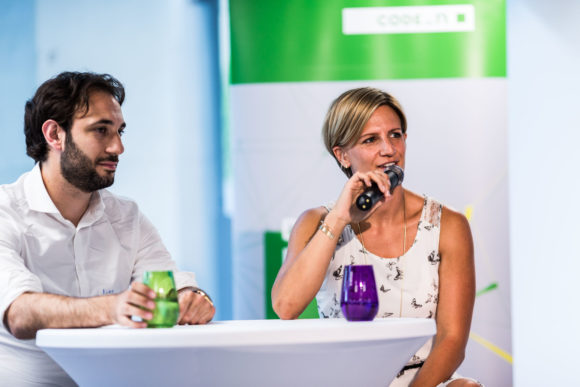
Nikolas Baltsios (Binando) and Tine Wienhold (EnBW).
Daimler and physiosense:from office chairs to versatile technology
The next partnership also got its start through a special program – in this case, the Startup Autobahn, an innovation project initiated by Daimler in cooperation with Plug and Play and the University of Stuttgart. Dr. Markus Beck, who works in research and pre-product development at Daimler, reported that they used very similar methods to sniff out new technology and innovation for the corporation. Daimler employees were given a break from their regular jobs so they could work on startup ideas with external staff. “Innovation doesn’t always have to come from a dedicated department,” said Markus. Instead, technology from other fields can offer exciting new solutions. In the meantime the number of scouted teams in the Startup Autobahn has grown to 400, and one of them found its way to Markus with an idea: using sensor technology to develop the perfect office chair. Today he is working in close collaboration with the physiosense startup, although its focus has now shifted from the office chair idea to a range of applications for the technology and the algorithm, as founder and managing director Björn Olaf Lang explained. In its current form, the alliance with Daimler is all about equipping and connecting products and evaluating ergonomic data. “There is extremely interesting data emerging in this area for the company, especially regarding aspects that are relevant to safety.”
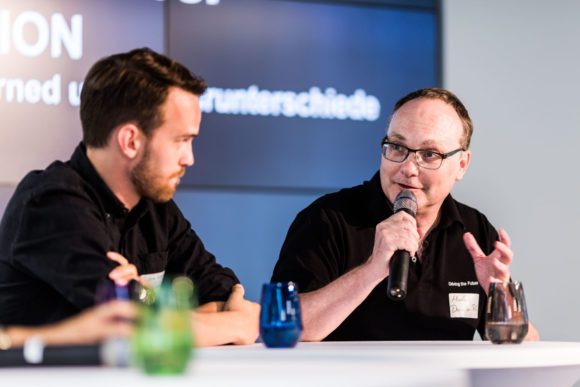
Björn Olaf Lang (physiosense) and Dr. Markus Beck (Daimler AG).
Cultures clash in the panel discussion
Moving right along, the talks on the two collaborations were followed by a charged panel discussion offering a frank and sometimes contentious look at the evening’s topic. The corporate/startup duos were joined on the panel by Alexander Buddrick, product manager at BrakeForce One, who strongly questioned the premise that such collaborations actually benefit startups. Alexander worked with Bosch Startup GmbH until recently and he offered a sobering assessment that painted an opposite picture to the examples provided by the other two collaborations. In his opinion, startups tend to get the short end of the stick in such partnerships. He said things are particularly difficult when there are already a lot of parties involved at the beginning, and so the shares in the company are already distributed accordingly. “The collaboration is only sustainable when both parties are actually pursuing their shared objective and taking it seriously. Culture and consistency – those are the two most important determiners for a successful collaboration.” And he was speaking from experience. His internal startup with Bosch failed – which he says also spelled the end of several dreams. In the meantime Alexander is chasing success with the startup idea with BrakeForce One by his side.
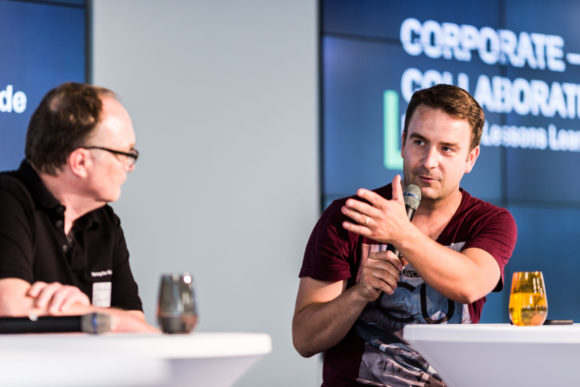
Alexander Buddrick (right) joined the panel and questioned the premise that such collaborations actually benefit startups.
The participants also had a heated discussion about the cultural differences between the two worlds. As Tine Wienhold noted: “Of course we also saw that our employees had a different mindset than the external startup team, who were pursuing an idea at full steam and giving 110 percent all day. This created internal tension, and it’s also where we hit our limits. So now in this area, we work more with external teams. But then we try to give them as much freedom as possible in the implementation – and this helps keep the drive alive.”
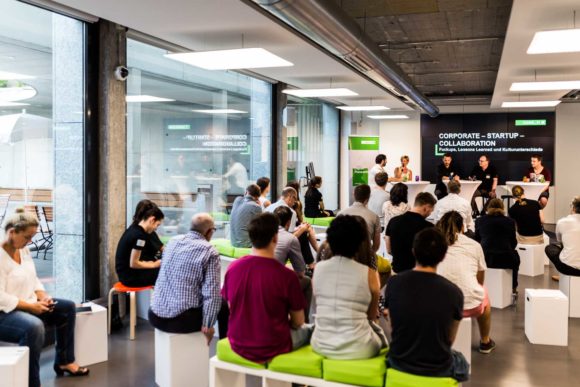
Niko agreed that this sort of autonomy was essential to the success of Binando. And Markus Beck once again underscored that for him, the collaboration with physiosense offers a unique opportunity to catch hold of new technologies that might still seem light-years away. “Without our partnership with a startup, it would be hard for me to get the necessary attention and budget within our company. Having an external partner makes it possible to pursue topics that will grow in importance in the coming years.”
At the end of the day, everyone agreed that for a collaboration to succeed, it must be a partnership of equals – and that transparency and value creation for both parties are essential.
After this frank discussion – which made a number of pennies drop – and questions from the audience, it was time to kick back together and chill. The warm summer evening was perfect for a barbeque and drinks in the courtyard – offering a great opportunity to network and talk about the ideas gleaned and lessons learned from the event. Be sure to take a look at all the photos of the event on flickr.
Networking at the garden of restaurant #SW34. #Event on #startups & corporations’s been a success. Let’s enjoy the evening now. #stuttgartpic.twitter.com/xj4SCKGEZu
— CODE_n (@CODE_n) June 22, 2017
And don’t miss the next event at CODE_n, when we take a look at other important issues affecting our industry and shed more light on the opportunities arising from digital transformation. We hope to see you there!


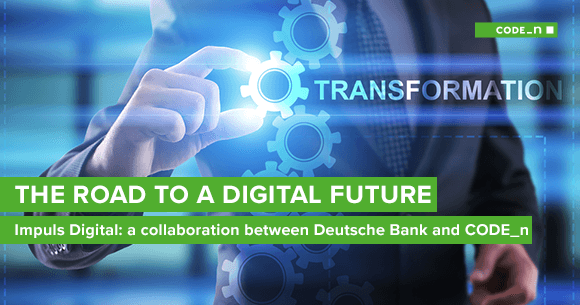

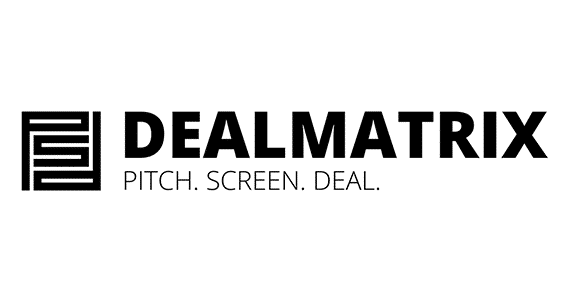
Write a comment